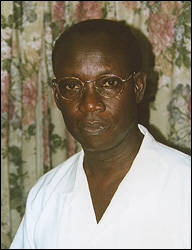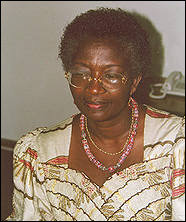 The
New Path for Agriculture The
New Path for Agriculture
Statistics available indicate that other sectors of the economy are responding well to the country’s economic growth, but not the agricultural sector. It has witnessed a downward trend, recording only 3.3 per cent growth in 1995 from a high point of 5.2 per cent in 1992.
This is a source of worry for the government because the food and agricultural sector is a dominant area in Ghana’s economy in terms of its shares of the GDP, employment and foreign exchange earnings. Records show that in 1999, the sector employed about 70 per cent of the entire national labor force, contributed about 47 per cent to the GDP and accounted for 40 per cent of the total foreign exchange earnings. It also served as an important source of raw materials for the manufacturing sector.

Mr. J. H. Owusu-Acheampong, Minister of Food and Agriculture , says that under the Ghana Vision 2020 the sector is expected to ensure food security for the nation and also adequate nutrition for all Ghanaians. "We are expected to supply raw material and other inputs to the other sectors of the economy. We are also supposed to contribute to an improvement in the balance of payment of our nation by way of exports and revenue. Our goal is also to provide producers with farm incomes comparable to any other sector" he said.
In addition, the sector is expected to change its productivity, to increase its production on per capita basis and to improve upon its ability to capture various markets both within and outside the country. Government expects within the next few years that the sector will grow by about 6 per cent but this figure may not be achieved because of the climatic conditions. Ghana’s farmers depend largely on rain-fed agriculture which is why the recent drought that hit the country affected the sector. Key areas that suffered were food cropping, livestock, cash crops and forestry.
Cocoa, the most important cash crop produced in the country, providing the second largest foreign exchange receipts for the government, has also been affected. Apart from domestic problems, the industry is also dogged with ritualistic fall in cocoa prices on the world market. But according to Minister Owusu-Acheampong, the government had been magnanimous over the past few months toward cocoa farmers, "Even though cocoa prices have gone so low on the international market we have tried to maintain the producer price that we gave to farmers in the previous year when prices were relatively high".
Stakeholders in the industry have criticized the government over the policy because whereas cocoa prices had fallen to about 50 per cent over a certain period, government continued to keep the same price for all participants in the industry which lead to a drop from 30 per cent to 9 per cent of cocoa’s contribution to government revenue. Mr. Ato Ahwoi , Managing Director of Cashpro , a licensed cocoa buying company with 18 per cent market shares, agrees that "the fall in cocoa prices and government’s insistence on paying farmers a high percentage of world market Free On Board (FOB) price, would definitely affect the country’s revenue".
As at June this year, Cocoa prices have fallen almost 50 per cent, creating serious macro ramifications for the country because it is the fulcrum around which other economic activities turn, so price falls have serious downstream impact. Analysts estimate that next year, if there is no fundamental change in prices, Ghana will loose about 100 million dollars in cocoa tax revenue.
Recognizing the difficulties the industry faced, the government embarked in 1992 on structural reforms. First, it decided to deregulate the marketing and purchase of cocoa from farmers. The Ghana Cocoa Board, (COCOBOD) the sole government agent, have now registered and licensed 20 buying companies including Cashpro to compete with its own Produce Buying Company (PBC). As part of government policy, licensed companies which have qualified in terms of criteria will be permitted to export 30 per cent of the cocoa they purchase in 2000/1.
According to Mr. JH Newman , Chief Executive of COCOBOD, in line with the same policy PBC will also be privatized soon. COCOBOD will then become a regulatory body and only intervene where necessary. These down turn events in the industry are not deterring COCOBOD to look ahead into the future. Ghana is beginning to make in roads into the South East Asian Markets, "We export cocoa to Singapore, Malaysia and we are exploring the Brazilian market all in an effort to expand our market base." said Mr. Newman.
| The restructuring and deregulation of the cocoa sector seems to be benefiting the private participants, particularly Cashpro who has become a market leader and listed as the 17th largest company in Ghana. Cashpro established in 1990, basically to buy cashew nuts and spices, is waiting to take advantage of the government’s policy to begin exporting 30 per cent of its internal purchases. Before then "we would have to look for partners who will assist in buying and exporting of about 20,000 tons, representing 30 per cent of the company’s estimated 60,000 tons of cocoa purchase per annum" he said.
Other areas of the agricultural sector are however recording significant gains. The commercial forest sector over the year has become a major source of revenue for government. Forest products particularly timber which is concentrated in the southern part of the country has become a major foreign exchange earner for Ghana.

Unlike gold and cocoa, the timber industry continues to attract investors. But the government recognizing the effect timber felling is having on the country’s forest reserves has initiated programs to encourage process of timber instead of the exportation of log. "We are moving more and more into downstream processing instead of just cutting the logs and sending them out, which does not fetch much. We are now converting into furniture and other components", emphasized Dr. Christina Amoako-Nuama , Minister of Lands and Forestry. The vision of the government is to increase the export of furniture and other value added forest products, so it is encouraging companies to bring in equipment that would add more value instead of just primary breakdown equipment.
To ensure that its policies are being carried out as well as promotion of timber outside the country, the government has set up the Timber Export Development Division (TEDD) under the Forestry Department. "We are supposed to help modernize the industry to make sure that it moves downstream and produces value added products. We provide technical support, develop skills and provide marketing intelligence for the industry", said Mr. Samuel Kwasi Appiah , Managing Director of TEDD. A major concern of the government is that the supply of timber from forest is far less than the demand on the industry. "This is a big problem that we are facing. We believe that in the next 20 years, we have to plant fast growing species to make up deficits", Mr. Appiah said.
As an incentive to attract companies to embark on large scale tree planting, the government has established a land bank and a nine million dollar Forest Improvement Fund.
 FOOD FOR THE PEOPLE FOOD FOR THE PEOPLE
Food production also recorded gains, but the Minister of Food and Agriculture, remarked that "As of now we are importing about 400,000 metric tons of rice which we want to bring down to about a third or less within the next couple of years because for food security rice is the main problem, we are self sufficient now in all other crops."
Government officials say the major problem facing the sector is marketing of the non traditional crops; maize cassava and cocoyam. The only crop that Ghana has advantage over is the export of pineapples. Regarded as the best in the region, Ghana exported two years ago 27,000 metric tons but that was reduced downwards to 22,000 metric tons last year. Another crop which is making significant strides is yam which is being exported to the US and European markets. Banana exports are however being blocked by stringent European Union restrictions, but the government is pursuing the matter to ensure increased quotas for the export of the commodity into the European market.
Another strong point for Ghana is the fishing industry. "In the fishing sector our main advantage is the tuna production, but we want to process it further into flakes for exports into the European market." said Minister Owusu-Acheampong.
In terms of private participation in agro-processing the sector continues to attract a stream of foreign investors. Heinz International for example is a majority shareholder in the Pioneer Food Cannery Factory.
Analysts believe that the sector could attract more investors if the government took steps to address the land tenure system; acquisition of land and agriculture financing. Fortunately, the government has recognized the impediment. "We are trying to assess the governed agricultural lands we have and compile data on them, so that we can show investors these areas when they come in. That will make it easier for investors to acquire land." Mr. Owusu-Acheampong said. |

